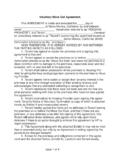Transcription of Commercial Landlord-Tenant Law in Florida
1 Commercial Landlord-Tenant Law in Florida by GARY S. SALZMAN, ESQ. GrayRobinson, 301 East Pine Street, Suite 1400 Orlando FL 32801 Telephone: (407) 843-8880 Facsimile: (407) 244-5690 Email: 1 (I) TERMINATION OF Commercial LEASES A. Grounds for termination. Termination or forfeiture of a Commercial leasehold is legally justified where there is a breach of a material covenant or condition of the lease or a violation of applicable law authorizing termination. Although there are numerous grounds to terminate a Commercial lease, they generally fall within two categories: monetary and non-monetary grounds. 1. Monetary grounds for termination. A monetary basis to terminate a lease occurs where a party, usually the tenant , fails to meet a financial obligation due the other party, usually the landlord , under the lease or applicable law. In addition to a tenant s failure to pay rent when due, other monetary grounds for termination would include a tenant s failure to pay its portion of common area maintenance, taxes or the costs of repairs or improvements for the demised premises.
2 Florida courts typically uphold a landlord s termination of a lease based upon monetary grounds, provided however, that the requisite notice has been served and the time to cure has expired. 2. Non-monetary grounds for termination. Non-monetary grounds for termination of a lease are more problematic and are disfavored by Florida courts. On the tenant s behalf, a lease may be terminated if the landlord materially breaches a material obligation due the tenant under the lease or applicable law, such as the covenant of quiet enjoyment resulting in a constructive eviction. Another example would be where the landlord is obligated to make repairs to the demised premises, but fails to do so after receiving the requisite notice from the Examples of non-monetary grounds that may justify the landlord terminating a lease may include the lapse of a tenant s liability insurance required under the lease, the assignment or subletting of the premises without the landlord s consent and the appointment of a receiver over the tenant .
3 In order for a non-monetary ground for termination to be judicially enforced, there must be evidence that the tenant s or landlord s interests have been materially prejudiced and a forfeiture will not result in an unconscionable or inequitable result. This rule is illustrated by the following summary of selected cases involving non-monetary grounds for termination of Commercial leaseholds. 1 , Fla. Stat. (2009). 2 In Sharpe v. Sentry Drugs, Inc., a lessee sublet a portion of its Commercial space in violation of a lease provision requiring prior written consent of the The lessor gave notice of termination of the lease based upon this breach and sued for termination. The trial court agreed and upheld the termination. On appeal, however, the court reversed stating that, although the sublease was a breach of the primary lease, the breach was not sufficient to constitute a forfeiture of the main lease agreement as a matter of law.
4 3 The court s decision was based upon the equitable principle that a court may refuse to enforce a forfeiture where the effect of doing so would result in an unconscionable, inequitable or unjust eviction under the In other words, subletting in violation of the primary lease was not material enough to prejudice the lessor s interests so as to justify a In Great Southern Aircraft Corp. v. Kraus, the court held that a non-assignment clause in a lease does not prevent the lessee from mortgaging the leasehold The court based its decision, at least in part, upon the principle that a covenant restricting a tenant s power to transfer the leasehold is to be strictly construed in favor of In Gooding s Supermarket, Inc. v. Net Realty Holding Trust, Goodings was one of Net Realty s shopping center Under the lease, Net Realty was responsible to maintain the common areas and indemnify Goodings from all claims arising out of the common area. A lawsuit was later commenced by Goodings to terminate the lease.
5 The grounds for termination were that Net Realty breached the lease by not carrying the proper insurance for its indemnity obligations. The trial court ruled in favor of Goodings. The appellate court affirmed, holding that Net Realty materially breached the lease and was given sufficient notice to cure the default, but failed to do In Fowler v. Resash Corp., a tenant made unauthorized improvements to the 2 Sharpe v. Sentry Drugs, Inc., 505 So. 2d 618 (Fla. 3d DCA 1987). 3 Id. at 618. 4 Id. 5 Id. at 619. 6 Great S. Aircraft Corp. v. Kraus, 132 So. 2d 608 (Fla. 1961). 7 Id. 8 Gooding s Supermarket, Inc. v. Net Realty Holding Trust, 703 So. 2d 1136 (Fla. 5th DCA 1997). 9 Id. at 1137. 3 premises under a 99-year Commercial As a result, the landlord declared a default of the lease. The landlord re-let the premises for a substantial increase in rent. In holding for the tenant , the appellate court determined that the landlord s termination of the lease, which had approximately 50 years left before it expired, resulted in the landlord becoming inequitably and unjustifiably enriched at the expense of the The court also determined that the landlord had not suffered any actual damages as a result of the improvements made by the Many Commercial leases contain a clause that states the appointment of a receiver over the tenant constitutes a material breach of the lease justifying termination.
6 Whether this is an enforceable clause under Florida law is not clear, since there are no Florida cases on point. However, the following out-of-state cases should be persuasive on any Florida courts. In Carson v. Imperial 400 National, Inc., the Supreme Court of North Carolina stated that a provision in a lease authorizing a lessor to terminate the lease upon the appointment of a receiver was not void and was not contrary to public policy nor prohibited by In Superior Motels, Inc. v. Renn Motor Hotels, Inc., a Commercial lease provided that the appointment of a receiver over the tenant s assets constituted a breach of the A receiver was later appointed over a sub- tenant . As a result, the landlord declared a breach of the lease and sued for termination. In holding for the landlord , the California court reasoned that this type of a lease provision protects an important interest of the lessor. The court noted that the appointment of a receiver often results in drastic disruptive consequences to existing business relationships.
7 Thus, the appellate court affirmed the trial court s finding that there was a material breach justifying the landlord s right to terminate the lease and retake possession of the (II) WAIVER OF GROUNDS FOR TERMINATION. 10 Fowler v. Resash Corp., 469 So. 2d 153 (Fla. 3d DCA 1985). 11 Id. 12 Id. at 154. 13 Carson v. Imperial A400@ Nat l, Inc., 147 898 ( 1966). 14 Superior Motels, Inc. v. Renn Motor Hotels, Inc., 195 Cal. App. 3d 1032 (Cal. App. 1987). 15 Id. at 1055. 4 By accepting of the full amount of rent that is due with knowledge of the tenant s breach of the lease for nonpayment of rent, the landlord will be deemed to have waived any right to terminate the lease and retake possession of the premises as a result of the tenant s failure to pay This statutory waiver follows the common law rule that a party to a contract may waive a default thereunder by express agreement or by conduct. However, most leases contain anti-waiver provisions stating that the landlord s acceptance of any rent or any action of forbearance shall not be deemed a waiver of any rights that the landlord has as of that The following is an example of typical anti-waiver provision: This lease may only be modified, altered, or amended, in whole or in part, by a written instrument setting forth such changes and signed by all parties hereto.
8 This lease constitutes the entire agreement and understanding between the parties and all other agreements and understandings between them, whether oral or written, are hereby deemed void and merged into this lease. The landlord s acceptance of rent, or any act of forbearance concerning any breach or violation of this lease by the tenant shall not be construed as a waiver of any rights the landlord has hereunder. No delay or omission on the part of the landlord in exercising any right hereunder shall operate as a waiver of such right or any other right. Notwithstanding a lease provision similar to the foregoing, at least one Florida court has held that the landlord s conduct of accepting late rent was not only a waiver of the tenant s default for failure to pay rent, but was also a waiver of the anti-waiver provision In that case, however, the lessor accepted the late rent payments without protest and never notified the lessee that it was in default of the Florida s parol evidence rule also provides some protection against a party to a lease alleging that its terms were modified or waived by an oral agreement.
9 The rule is that, if the terms of a contract are unambiguous and the contract is a complete agreement, those terms are not subject to modification, variance or contradiction by parol (oral) If the lease agreement is ambiguous as to the parties intent on any matter, 16 , Fla. Stat. (2009). 17 Philpot v. Bouchelle, 411 So. 2d 1341 (Fla. 1st DCA 1982). 18 Protean Investors, Inc. v. Travel, Etc., Inc., 519 So. 2d 7 (Fla. 3d DCA 1987). 19 Id. 20 Titusville Assocs., Ltd. v. Barnett Banks Trust Co., 591 So. 2d 609, 611 (Fla. 1991); Co & Co Enters., Inc. v. Robertson, 761 So. 2d 1179 (Fla. 4th DCA 2000); Newbern v. Am. Plasticraft, Inc., 721 So. 2d 351, 352 (Fla. 2d DCA 1998); Polk v. Crittenden, 537 So. 2d 5 parol evidence will be admissible on the The parol evidence rule serves as a shield to protect a valid, complete and unambiguous written instrument from any verbal assault that would contradict, add to, subtract from it, or affect its construction.
10 22 Since the rule only applies if the parties agreement is unambiguous and complete, it is important that the lease expressly state that it is the entire agreement between the landlord and the tenant and all other oral or written understandings and agreements are merged into the lease and are deemed void. A common claim by tenants is that a landlord s acceptance of late rent payments on several prior occasions evidences a waiver by conduct of any strict compliance for when the rent is due under the lease. To undermine this defense, many leases include the following type of anti-waiver clause to prevent the assertion of a continuing waiver: The landlord s acceptance of rent, or any act of forebearance or waiver of any breach or violation of this lease by the tenant shall not be construed as a continuing waiver or consent to any subsequent breach or violation by the tenant and shall not bar landlord s right to demand strict compliance with that provision or any other provision of this lease.













